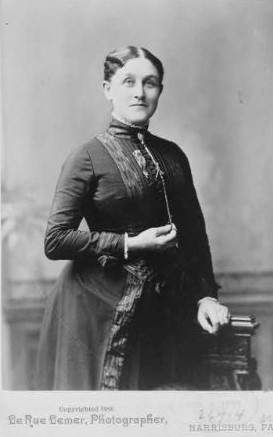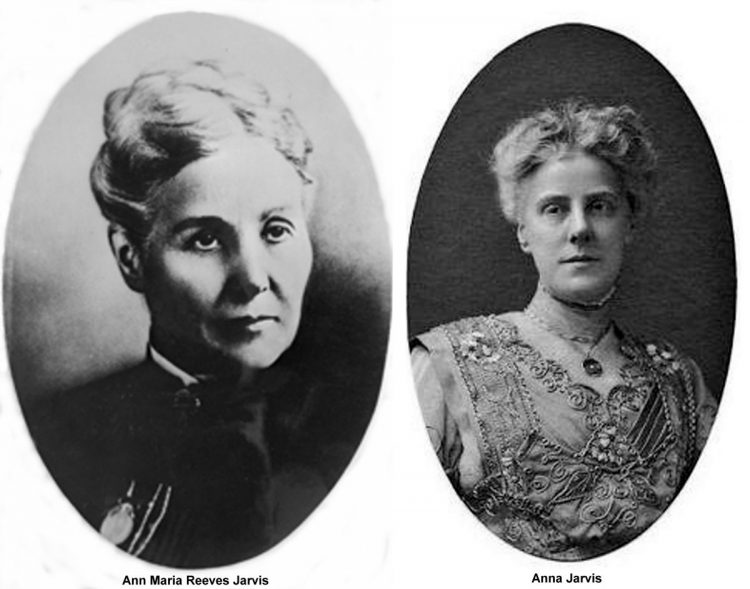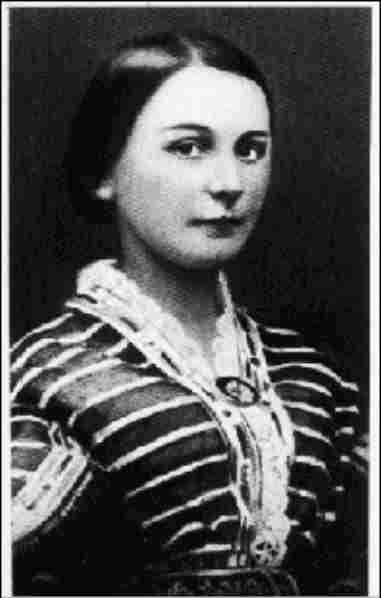Abolitionist and Fugitive Slave from Georgia Ellen Craft was a slave from Macon, Georgia who escaped to the North in 1848. Craft, the light-skinned daughter of a mulatto slave and her white master, disguised herself as a white male planter. Her husband William Craft accompanied her, posing as her personal servant. She traveled openly by train and steamboat, arriving in Philadelphia on Christmas Day 1848. Her daring escape was widely publicized, and she became one of the most famous fugitive slaves. Ellen Smith was born in 1826 in Clinton, Georgia, to a biracial slave woman named Maria and her white master, Colonel James Smith. Ellen was so light-skinned that she was often mistaken for a member of her father’s family….
Catherine Devereux
Civil War Diaries from North Carolina Catherine Devereux Edmondston (1823-1875) was a member of the planter aristocracy of Halifax County, North Carolina. She was an educated woman of strong character whose intelligence and prejudices surfaced repeatedly in her letters and Civil War diaries. During the 1850s Catherine and her husband Patrick enjoyed a calm, fairly prosperous life at Looking Glass plantation. By 1860 they owned 88 slaves and a 1,894-acre estate, and were ardent secessionists. Catherine Ann Devereux was born in 1823, one of six children to Thomas Pollock Devereux and Catherine Ann Bayard Johnson. She was raised in a wealthy plantation owning family where she received a private education from her father. In 1846 she married Patrick Muir Edmondston,…
Sarah Grimke
One of the First Social Reformers in the United States Sarah Moore Grimke, the lesser known of the Grimke sisters, was born November 26, 1792, in Charleston, South Carolina, the daughter of Judge John Grimke. Sarah was a writer, an abolitionist and an early advocate of women’s rights. At five years old, she saw a slave being whipped and tried to board a steamship that could take her to a place where there was no slavery. The Grimkes lived alternately between a fashionable townhouse in Charleston and a thriving cotton plantation in Beaufort with hundreds of slaves. Judge Grimke was the Chief Justice of the South Carolina Supreme Court. He was a strong advocate of slavery and of the subordination…

Rebecca Wright
Virginia Spy for the Union Rebecca McPherson Wright, a Union spy during the Civil War, was born near Winchester, Virginia in January, 1842. Her family was one of the few in Winchester who supported the Union. Her father, Amos Wright, died in a Confederate prison early in the war. Rebecca was a schoolteacher, and due to her Quaker beliefs, she abhorred slavery. In August 1864, Confederate General Jubal Early’s army occupied Winchester. While trying to discover the troop strength of Early’s army, Federal scouts came across Thomas Laws, an elderly slave, at his home. When Laws told them that he had a permit to pass through the Confederate lines three times a week to sell vegetables, the scouts enlisted his…

Anna Jarvis
Founder of Mother’s Day Anna Marie Jarvis is the founder of the Mother’s Day holiday in the United States. Her birthplace, known as the Anna Jarvis House, was listed on the National Register of Historic Places in 1979. It was built in 1854 and is a two story, frame dwelling, which is also notable as General George B. McClellan‘s first field headquarters during his 1861 western Virginia campaign. Anna Marie Jarvis was born May 1, 1864, in Webster, West Virginia, the ninth of eleven children born to Reverend Granville and Ann Reeves Jarvis. The family moved to nearby Grafton when Anna was a year old. In 1881, she enrolled at the Augusta Female Academy in Staunton, Virginia, now Mary Baldwin…
Emma Holmes
Diarist in Charleston, South Carolina Emma Holmes, a Civil War diarist and teacher, was born in 1838 in Charleston, South Carolina, to a plantation owner. During the Civil War, from February 1861 until March 1866, Emma kept a diary of her life in Charleston, the affairs of her family and history as she observed it. A true Confederate, like many others, she believed the war would be over within a few months. In the spring of 1861, Emma recorded in her diary that “the city seemed suddenly turned into a camp. Nothing was heard but preparations for war. The great body of citizens [seems] to be so impressed with the justice of our cause that they place entire confidence in…

Ann Maria Jarvis
Ann Maria Reeves was born in Culpeper, Virginia, on September 30, 1832, the daughter of the Reverend Josiah Reeves. When Ann was 12 years old, the family moved to Barbour County in present-day West Virginia, when Reverend Reeves was transferred to a Methodist church in Philippi. Ann Maria Reeves Jarvis and daughter Anna Jarvis In 1850, Ann married Granville E. Jarvis, the son of a Philippi Baptist minister, and moved to Webster in Taylor County. Ann gave birth to eleven children, but only four lived to adulthood. Two years later, Ann organized a series of Mothers’ Day Work Clubs in Webster and other nearby towns to improve health and sanitary conditions, which contributed to the high mortality rate of children…
Anna Dickinson
Abolitionist and Lecturer during the Civil War Anna Elizabeth Dickinson was an abolitionist, writer, lecturer and advocate for women’s rights. A gifted speaker at a very young age, she significantly influenced the distribution of political power in the Union just prior to the Civil War. She helped the Republican Party gain key positions in the hard-fought election campaigns of 1863, and was the first woman to speak before the U.S. Congress. Childhood Anna Elizabeth Dickinson was born in Philadelphia on October 28, 1842, the youngest of five children of Quaker parents. Her father was a dedicated abolitionist who died of a heart attack shortly after giving a fiery antislavery speech in 1844. Since Anna was only two years old, she…

Betty Churchill Lacy
Betty Churchill Jones was born at Ellwood Plantation in Spotsylvania County, Virginia, near Fredericksburg. In the years following the Revolutionary War, brothers William and Churchill Jones went about acquiring homesteads in the Wilderness area of Virginia. William and his first wife built Ellwood in the 1790s. Churchill acquired the Falmouth mansion, Chatham, in 1806. Churchill Jones died in 1822, leaving Chatham to his brother, William, who was well advanced in years and already owned one large estate. He transferred Chatham to Judge Coalter, the husband of his only daughter, Hannah. He could not have bequeathed it directly to Hannah – it was unlawful for women to own property. In 1828, William Jones, in his 79th year, married Lucy Gordon, who…
Eugenia Phillips
Confederate Spy in the Civil War Born into an assimilated Jewish family in the South, Eugenia Phillips, like many Southern Jews, was a strong supporter of the Confederate cause. Beginning in 1861, Phillips aided Confederate spy networks and secretly passed material aid to Confederate troops. The family later moved to Georgia, where Phillips supposedly toned down her outspoken support of the Confederacy. Eugenia Levy was born in Charleston, South Carolina in 1820 to prominent Jewish parents. One of six daughters, Eugenia was well-educated, outspoken and fiery-tempered. At age l6, she married a prominent Jewish lawyer, Philip Phillips, who was 13 years her senior. The couple moved to Mobile, Alabama, where he had already established a successful law practice. He and…